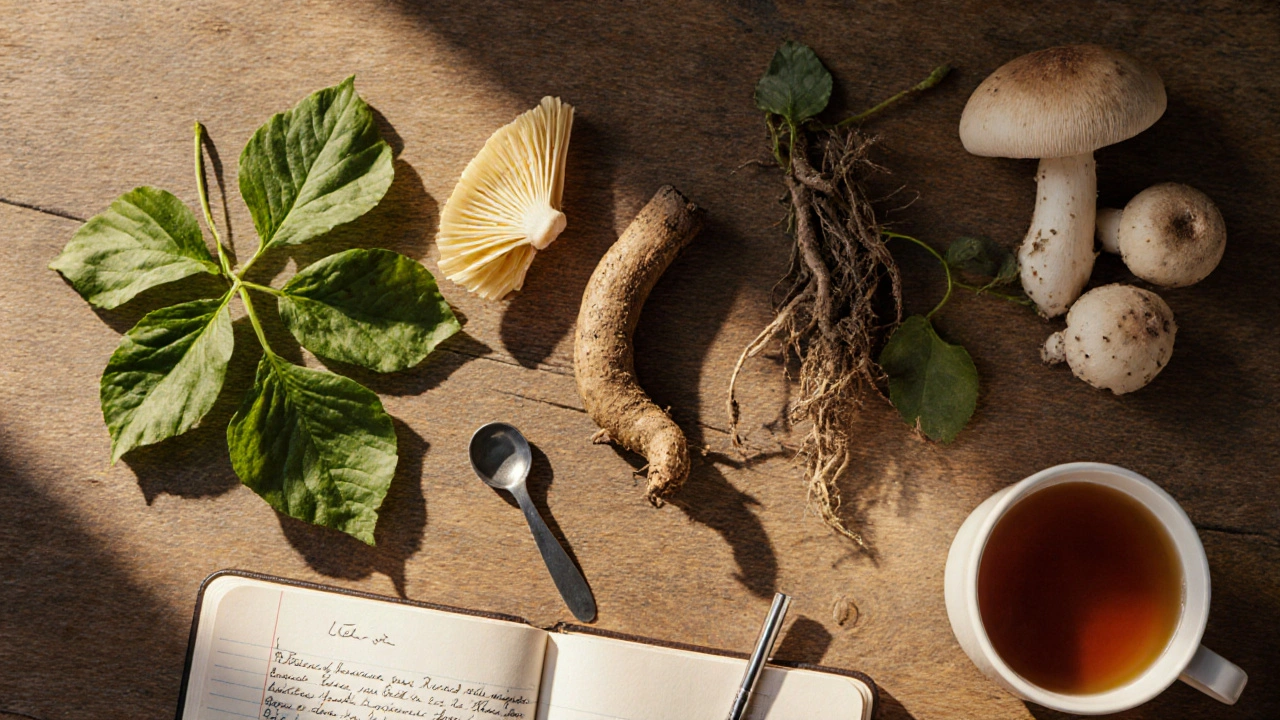
Which Brain Herb Is Right For You?
Looking for a natural brain boost but unsure which herb to pick? This comparison breaks down Brahmi alongside four popular alternatives, so you can match the right plant to your goals, budget, and tolerance.
Key Takeaways
- Brahmi excels at improving memory retention and reducing anxiety, especially for long‑term study or work projects.
- Ginkgo biloba shines for circulation‑related cognition issues but may interact with blood‑thinners.
- Ashwagandha offers a blend of stress relief and mild cognition support, ideal for busy professionals.
- Rhodiola rosea is best for acute fatigue and mental stamina during short‑term stress spikes.
- Lion’s Mane provides neuro‑protective benefits and may enhance nerve‑growth factor, making it a good choice for aging brains.
What is Brahmi?
Brahmi is a freshwater herb (Bacopa monnieri) traditionally used in Ayurvedic medicine to sharpen memory, focus, and calm the nervous system. It contains bacosides that modulate neurotransmitters, especially serotonin and acetylcholine, which are key players in learning and mood regulation.
Quick Overview of the Alternatives
Ginkgo biloba is a tree leaf extract known for boosting cerebral blood flow and antioxidant protection.
Ashwagandha (Withania somnifera) is an adaptogenic root that lowers cortisol and supports overall brain health.
Rhodiola rosea is a cold‑climate root that improves resilience to stress and combats mental fatigue.
Lion’s Mane (Hericium erinaceus) is a culinary mushroom that stimulates nerve‑growth factor (NGF) and may protect against neurodegeneration.

How the Five Herbs Stack Up
| Feature | Brahmi | Ginkgo biloba | Ashwagandha | Rhodiola rosea | Lion’s Mane |
|---|---|---|---|---|---|
| Primary benefit | Memory consolidation & anxiety reduction | Improved cerebral blood flow | Stress reduction & mild cognition support | Fatigue resistance & mood uplift | Neuro‑protective & nerve‑growth factor increase |
| Key active compounds | Bacosides A & B | Ginkgolides, bilobalide | Withanolides | Rosavins, salidroside | Erinacines, hericenones |
| Typical dose (standardized) | 300mg (20% bacosides) daily | 120‑240mg daily | 300‑600mg daily | 200‑400mg daily | 500‑1000mg daily |
| Onset of effect | 4‑6 weeks for full memory benefits | 2‑4 weeks for circulation improvements | Immediate calm, 2‑3 weeks for cognitive impact | Within hours for energy boost | 4‑8 weeks for neuro‑protective changes |
| Common side effects | Digestive upset, dry mouth | Headache, mild GI upset | Dry mouth, drowsiness (high dose) | Jitteriness, insomnia (if taken late) | Rare allergic reaction, mild GI distress |
| Best for | Students, professionals needing sustained focus | Older adults with age‑related circulation decline | High‑stress lifestyles, cortisol‑related fatigue | Athletes, shift workers, exam crammers | People concerned about neuro‑degeneration |
When Brahmi Is the Right Choice
If your main goal is to boost long‑term memory and keep anxiety at bay, Brahmi usually outperforms the others. Its bacosides work by enhancing synaptic signaling, which is especially useful for tasks that require learning over weeks or months (think language courses or complex project planning).
Because Brahmi is non‑stimulant, it won’t give you the jittery boost that Rhodiola offers, making it safer for people sensitive to caffeine or other stimulants.
Its safety profile is solid for most adults, but pregnant or nursing women should avoid it until more research confirms safety.
When One of the Alternatives Might Suit You Better
Ginkgo biloba shines for seniors who notice “brain fog” linked to slower blood flow. If you’re on blood‑thinners, discuss with a doctor first because ginkgo can increase bleeding risk.
Ashwagandha is a go‑to for anyone battling chronic stress. Its cortisol‑lowering effect supports mental clarity even when the workload spikes.
Rhodiola rosea is perfect for a quick energy lift before a marathon study session or a night shift. The effect is felt within hours, but avoid taking it after 4p.m. to prevent sleep disruption.
Lion’s Mane is the most research‑heavy for neuro‑protection. If you’re concerned about age‑related decline or want to support nerve regeneration after an injury, this mushroom provides a unique NGF boost that the other herbs lack.

Safety, Interactions, and Contra‑Indications
All five herbs are generally regarded as safe when taken at recommended doses, but a few caveats apply:
- Ginkgo may interfere with anticoagulants like warfarin.
- Ashwagandha can lower blood sugar, so diabetics should monitor levels.
- Rhodiola’s stimulant‑like action may worsen anxiety for a small subset of users.
- Lion’s Mane is low‑risk but can cause mild digestive upset in some people.
- Brahmi may cause mild nausea; taking it with food usually helps.
Always start with the lowest effective dose and gradually increase, watching for any adverse reactions.
Practical Tips for Choosing & Using Your Herb
- Identify your primary goal (memory, stress, fatigue, neuro‑protection).
- Check for any medication interactions-especially blood thinners, thyroid meds, or antidepressants.
- Pick a standardized extract (e.g., 20% bacosides for Brahmi, 24% ginkgoflavone glycosides for Ginkgo).
- Take the supplement with a meal to improve absorption and reduce GI upset.
- Track results for at least 4 weeks; note changes in focus, mood, and any side effects.
Combine herbs only under professional guidance. Some users successfully stack Brahmi with Ashwagandha for a balanced stress‑memory combo, but overlapping adaptogenic effects can be too much for sensitive individuals.
Bottom Line
There’s no one‑size‑fits‑all brain herb. Brahmi leads for sustained memory enhancement and anxiety reduction, while Ginkgo, Ashwagandha, Rhodiola, and Lion’s Mane each fill niche needs-from circulation support to rapid energy spikes and neuro‑protection. By matching the herb’s primary benefit to your personal challenges, you’ll get the most bang for your buck without unnecessary side effects.
Frequently Asked Questions
Can I take Brahmi together with other nootropics?
Yes, many people stack Brahmi with caffeine‑free nootropics like L‑theanine or CDP‑choline. Start with low doses and watch for any jitteriness or stomach upset. Avoid combining with strong stimulants if you’re sensitive to anxiety.
How long does it take for Brahmi to improve memory?
Clinical trials show noticeable memory gains after about 4‑6 weeks of consistent daily dosing. Full benefits may appear after 12 weeks.
Is Ginkgo safer than Brahmi for older adults?
Ginkgo is often chosen for age‑related circulation issues, but it can increase bleeding risk, especially if the person uses anticoagulants. Brahmi has a milder safety profile but works slower for memory. Consult a healthcare professional before deciding.
Can Ashwagandha replace Brahmi for focus?
Ashwagandha primarily lowers stress hormones; it can improve focus indirectly but isn’t as potent as Brahmi for direct memory consolidation. If stress is the main blocker, Ashwagandha works well; otherwise, combine or choose Brahmi.
What dosage of Lion’s Mane is needed for neuro‑protection?
Research uses 500‑1000mg of a fruiting‑body extract taken twice daily for at least 8 weeks to see measurable increases in nerve‑growth factor markers.





Comments (12)
Moumita Bhaumik
Everyone’s pushing these herbal supplements like they’re the cure‑all, but nobody tells you about the hidden agenda of big pharma disguising their chemicals as “natural”. The same corporations that dump toxins into our water are now whispering sweet nothings about bacosides. It’s a classic distraction technique, and you should stay skeptical before swallowing another capsule.
Sheila Hood
Sure, just pop a Brahmi pill and expect instant brilliance-yeah, right.
Melissa Jansson
When dissecting the neuropharmacological landscape of these botanicals, one must confront the profound epistemic dissonance that pervades consumer perception. While the lay audience glorifies Ginkgo’s vasodilatory prowess, the underlying cytoarchitectural modulation remains marginal. Ashwagandha’s adaptogenic cascade, although impressive in cortisol attenuation, fails to address synaptic plasticity in a quantifiable manner. Moreover, the ontological paradox of lion’s mane as both culinary delicacy and neurotrophic catalyst cannot be ignored. In short, the hype is a kaleidoscope of selective data cherry‑picking.
Max Rogers
Great points, but let’s keep the grammar in check: “Brahmi’s effects” not “Brahmis effects”. Also, remember to capitalize proper nouns like Ginkgo biloba. Overall, the information is solid and helpful.
Louie Hadley
I hear you, Max. It’s all about finding what fits each person’s lifestyle.
Ginny Gladish
The data presented here warrants a meticulous examination. While the dosage ranges are accurate, the side‑effect profile of Ginkgo lacks nuance concerning platelet aggregation. Moreover, the claim that Ashwagandha lowers blood sugar should be accompanied by references to glycemic index studies. The absence of longitudinal clinical trials for Lion’s Mane’s neuroprotective claims is a glaring omission. Overall, the article is informative but could benefit from stronger source citation.
Faye Bormann
Let me break this down for everyone who’s been scrolling through the sea of hype, because honestly, the conversation around these brain‑boosting herbs is nothing short of a theatrical showdown. First, Brahmi, the ancient Ayurvedic “brain‑food,” is celebrated for its ability to enhance memory consolidation, but the reality is that you’re looking at a 4‑6 week latency period before any noticeable difference-so it’s not a quick fix. Ginkgo, on the other hand, gets hyped for its vasodilatory effects, yet it carries a significant risk if you’re on anticoagulants, making it a double‑edged sword in the senior demographic. Then there’s Ashwagandha, the adaptogen that reduces cortisol; while it’s great for chronic stress, some users report a lingering drowsiness that can be counterproductive during a demanding workday. Rhodiola rosea is marketed as the “energy‑shot” of the herb world, delivering a rapid boost within hours, but it can also incite jitteriness if taken too late, which defeats its purpose for night‑shifters. Lion’s Mane, the culinary mushroom turned nootropic, promises neuro‑protection and nerve‑growth factor stimulation-an exciting prospect for aging brains, though the evidence is still emerging and demands consistent dosing for weeks. The comparative table does a decent job of laying out the basics, but it glosses over the fact that individual responses can vary wildly based on genetics, gut microbiota, and even diet. Additionally, the side‑effect column for each herb is a bit simplistic; for instance, Brahmi’s digestive upset can be mitigated by taking it with food, a tip the article barely mentions. What’s also missing is a discussion about stacking-yes, many users combine Brahmi with Ashwagandha for a balanced stress‑memory combo, but that can amplify the dry‑mouth effect, which can be uncomfortable. Finally, let’s not forget the financial aspect: high‑quality standardized extracts can be pricey, and not every brand maintains the same potency, leading to consumer confusion. In summary, each herb has its niche-Brahmi for sustained memory, Ginkgo for circulation, Ashwagandha for chronic stress, Rhodiola for quick energy, and Lion’s Mane for long‑term neuro‑protection-but the key is aligning your primary goal with the herb’s strength while staying mindful of interactions and realistic timelines.
Kathy Butterfield
Nice breakdown! 🌿 I’m leaning toward trying Ashwagandha for my work stress. 😌
Zane Nelson
While the author’s attempt at a comparative analysis is commendable, the oversimplification of complex phytochemical interactions betrays a superficial engagement with the literature. One expects a more rigorous appraisal from a discourse of this stature.
Sahithi Bhasyam
Indeed, the article does provide a helpful overview!!! However, the punctuation could be more refined---perhaps a semicolon instead of a comma in places??? Also, adding a few more cultural references could make it more relatable!! 😊😊
mike putty
Keep exploring and stay positive-you’ll find the right herb for you! Remember, consistency is key.
Kayla Reeves
It’s irresponsible to promote any supplement without stressing the importance of consulting a medical professional first.